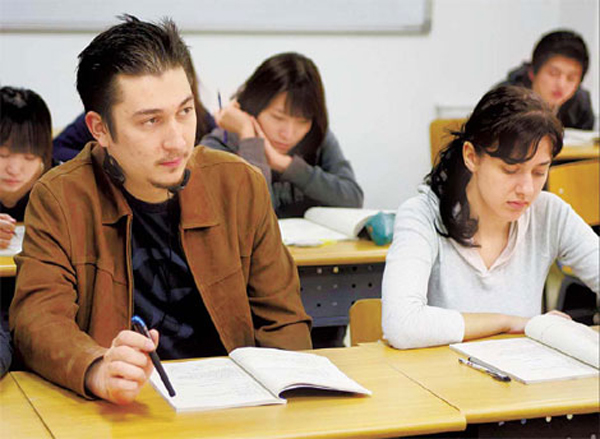Beijing is hoping to attract an additional 129,000 foreign students during the next decade as it seeks to make its learning facilities better recognized internationally, according to draft guidelines for the development of the capital's education system.
|

Overseas students take classes at Beijing Foreign Studies University.
|
Beijing had 71,000 foreign students last year and the number should rise to 150,000 in 2015 and 200,000 in 2020, the guidelines said.
In order to achieve the goal, the education authorities will grant more scholarships to foreign students, encourage cooperation between local schools and elite overseas educational institutions and establish more Confucius Institutes in universities in Beijing that will meet demand for Mandarin classes.
In 2008, Beijing made 35 million yuan available to support foreign students and spent 15 million yuan on Mandarin promotion, according to the Beijing Municipal Education Commission.
In addition, Beijing will send more teachers to study overseas in order to raise the city's overall education level.
The commission is soliciting public opinion on the Draft Guidelines on Beijing's Long- and Mid-Term Education Reform and Development, which was issued on Wednesday.
The 13-chapter, 25,000-word report also stipulates that the government will build 300 new kindergartens and renovate 300 existing ones in the next 10 years to ensure the preschool enrollment rate reaches 99 percent from the 90.3 percent it was last year.
By the end of 2020, 6,000 more kindergarten teachers majoring in preschool education will enter kindergartens across the city.
Issues, such as children of migrant workers enjoying the same admission policies as their city counterparts, high school tuition exemption for people with disabilities, reduction of study load during compulsory education, and credits accreditation among different universities, are also high on the education authority's agenda.
Chen Zhiguo, the father of a middle school student, told METRO he hopes the policy of alleviating school burdens will be put into effect as soon as possible.
He said mathematics, physics and chemistry taught in middle school were too difficult for students, and class hours were too long.
"My boy often does homework until midnight, I wish he had more free time to play," he said.
(China Daily October 18, 2010)